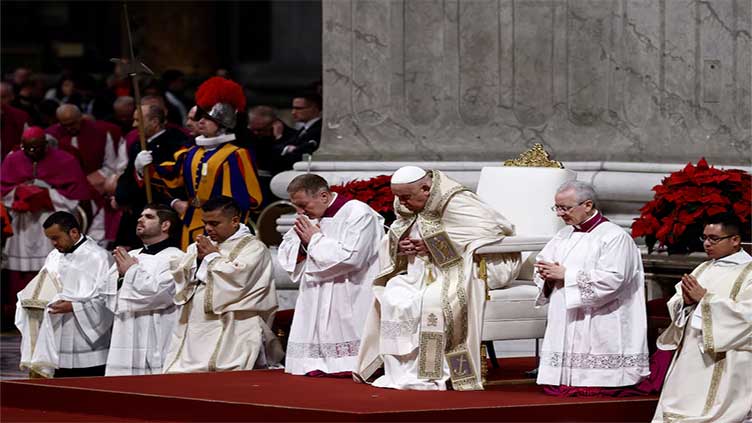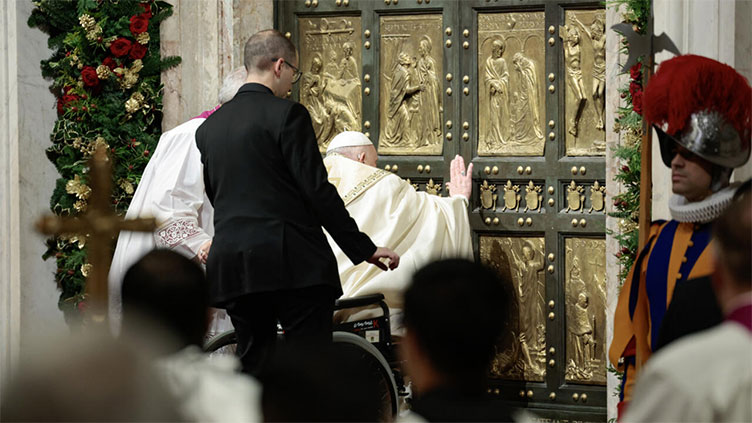On Christmas Eve, Pope Francis appeals for courage to better the world

World
Pope Francis opened the "Holy Door" of St Peter's Basilica on Christmas Eve on Tuesday.
VATICAN CITY (AFP/Reuters) – Pope Francis opened the "Holy Door" of St Peter's Basilica on Christmas Eve on Tuesday, launching the Jubilee year of Catholic celebrations set to draw more than 30 million pilgrims to Rome.
The 88-year-old pontiff, who has recently been suffering from a cold, was pushed in a wheelchair up to the huge, ornate bronze door and knocked on it, before the doors opened.
In a ceremony watched on screens by thousands of faithful outside in St Peter's Square, the Argentine pontiff went through the door followed by a procession, as the bells of the Vatican basilica rang out.
Francis, celebrating the 12th Christmas of his pontificate, presided at a solemn Christmas Eve Mass in St. Peter's Basilica and opened the 2025 Catholic Holy Year, which the Vatican expects will bring some 32 million tourists to Rome next year.

A MESSAGE OF HOPE
In a sermon focused on the virtue of hope, which is also the theme of the Holy Year, the pontiff said hope "is a summons not to tarry, to be kept back by our old habits, or to wallow in mediocrity or laziness".
"Hope calls us ... to be upset with things that are wrong and to find the courage to change them," he said.
A Catholic Holy Year, also known as a Jubilee, is considered a time of peace, forgiveness and pardon. They normally occur every 25 years. Pilgrims coming to Rome during the year can obtain special indulgences, or remission of their sins. This Jubilee will run through Jan. 6, 2026.
At the beginning of Tuesday's ceremony, Francis oversaw the opening of a special bronze-panelled "Holy Door" at St. Peter's, which is only open during Jubilee years. The Vatican expects up to 100,000 pilgrims to walk through the door each day next year.
At the papal Mass for an estimated 6,000 people in St. Peter's Basilica and 25,000 more watching on screens in the square outside, the pope also repeated an earlier call for developed nations to use the Jubilee to reduce the debt burden faced by low-income countries.
"The Jubilee calls us to spiritual renewal and commits us to the transformation of our world," said the pontiff. "A time of jubilee for the poorer countries burdened beneath unfair debts; a time of jubilee for all those who are in bondage to forms of slavery old and new."
A call for direct debt cancellation made by the late Pope John Paul II during the Jubilee year in 2000 sparked a campaign that resulted in $130 billion of debt cancellation between 2000 and 2015.
Francis, who turned 88 this month, has been suffering from what the Vatican has described as a cold. He appeared on good form Tuesday evening, although his voice was a little raspy.
On Wednesday, the pope will deliver his Christmas Day "Urbi et Orbi" (to the city and the world) message and blessing.
Over the next 12 months, Catholic pilgrims will pass through the door -- which is normally bricked up -- by tradition benefiting from a "plenary indulgence", a type of forgiveness for their sins.
Pope Francis then presided over the Christmas Eve mass in St Peter's, where he turned once again to the victims of war.
"We think of wars, of machine-gunned children, of bombs on schools and hospitals," he said in his homily.
The pope had drawn an angry response from Israel at the weekend for condemning the "cruelty" of Israel's strikes in Gaza that killed children.
He was due to deliver his traditional Christmas Day blessing, Urbi et Orbi (to the city and the world), at midday on Wednesday.
ROME FACELIFT
Some 700 security officers are being deployed around the Vatican and Rome for the Jubilee celebrations, with measures further tightened following Friday's car-ramming attack on a Christmas market in Germany.
Much of Rome has also been given a facelift in preparation, with monuments such as the Trevi Fountain and the Ponte Sant'Angelo cleaned up and roads redesigned to improve the flow of traffic.
Many residents have questioned how the Eternal City -- where key sites are already overcrowded and public transport is unreliable -- will cope with millions more visitors next year.

Key Jubilee projects were only finished in the last few days after months of work that turned much of the city into a building site.
Inaugurating a new road tunnel at Piazza Pia next to the Vatican on Monday, Prime Minister Giorgia Meloni said it had taken a "little civil miracle" to get the project finished in time.
Over the course of the next few days, Holy Doors will be opened in Rome's three major basilicas and in Catholic churches around the world.
On Thursday, Pope Francis will open a Holy Door at Rebibbia prison in Rome and preside over a mass in a show of support for the inmates.
'PROFITEERING, UNFAIR DEBTS'
Organised by the Church every 25 years, the Jubilee is intended as a period of reflection and penance, and is marked by a long list of cultural and religious events, from masses to exhibitions, conferences and concerts.
"It's my first time in Rome and for me, to be here at the Vatican, I feel already blessed," said Lisbeth Dembele, a 52-year-old French tourist visiting St Peter's Square earlier.
The Jubilee, whose motto this year is "Pilgrims of Hope", is primarily aimed at the world's almost 1.4 billion Catholics, but also aims to also reach a wider audience.
Traditions have evolved since the first such event back in 1300, launched by Pope Boniface VIII.

This year, the Vatican has provided pilgrims with online registration and multilingual phone apps to navigate events.
Jubilee 2025 also has a mascot named Luce (meaning Light in Latin) inspired by Japanese anime cartoons.
The event will see groups from around the world come to Rome throughout 2025, from sports and business figures to migrants, artists and young people.
Among the groups registered on the official site is Italian LGBTQ group La Tenda di Gionata, reflecting the pope's call for the Church to be open to all.
In his homily, the pope said the Jubilee was a time for "spiritual renewal" and hope, including for "our mother Earth, disfigured by profiteering" and "for the poorer countries burdened beneath unfair debts".
As well as the regular Jubilees every 25 years, the Church has organised extraordinary Jubilees, the most recent in 2016. The next is in 2033 to commemorate the crucifixion of Jesus Christ.


